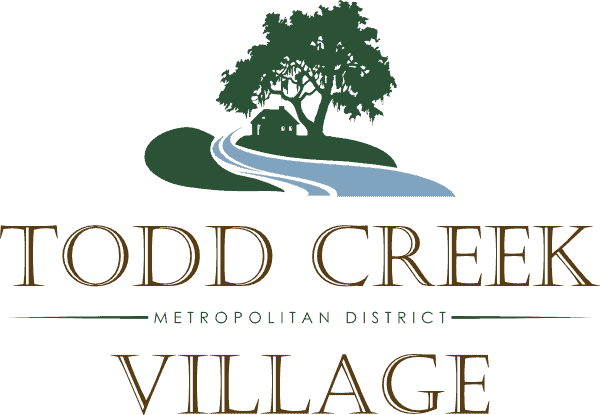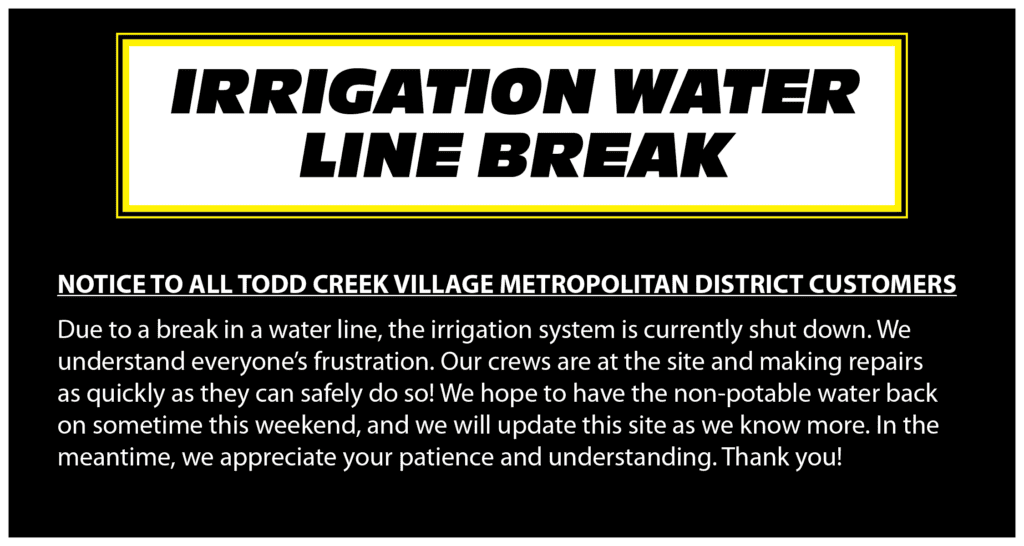FAQ Table of Contents
General FAQs
It is a quasi-governmental entity called a special district that provides the water and irrigation services for the Todd Creek Village community.
A special district is a political subdivision of the State of Colorado, which is established to provide community services such as (in our case) water, irrigation and wastewater services. They are all non-profit quasi-governmental entities that have the power to tax and provide any community services, except law enforcement. An elected board of directors, each of which must permanently reside or be property owners and registered in Colorado to vote, governs a special district.
The Board of Directors meets every 2nd Thursday of each month at 2:00 pm at the Todd Creek Golf Club, 8455 Heritage Dr., Thornton, CO 80602 unless otherwise posted. There are also special meetings scheduled when the need arises, which are also posted. All meetings are open to the public and are posted at least 72 hours before the meeting.
Please refer to the Board of Directors page of this website.
Yes, the public is always welcome to attend any of the monthly Board meetings.
We are located at 10450 E 159th Ct. in Brighton, CO 80602. The office sits directly south of the Todd Creek Fire station on Havana.
Water FAQs
We source water from alluvial wells near the South Platte River.
Todd Creek Village owns, operates, maintains, and repairs all the water and irrigation main lines. The main pipelines are the large pipelines that are generally located in the streets or open space, which serve more than one residence or facility. The property owner is responsible (owns) the water and irrigation service pipelines from the mainline connections to and throughout their home.
High water consumption in homes is usually caused by leaking toilets. A single toilet leaking at a rate as little as ¼ of a gallon a minute can consume as much as 11,000 gallons of water in a month. If you think you have a leak in a toilet it should be checked and repaired as soon as possible to avoid high water consumption.
One water meter is for potable (tap) water only. The second meter is for non-potable water used for irrigation only.
Potable meters are generally located in your basement or a meter pit in the front or rear of the property. Irrigation meters are in a meter pit in the front or rear of the property.
The District reads your meter once a month. The information is transmitted by radio as a district operator drives by your home.
If you suspect a leak but are unable to locate it, you can schedule a free leak check by calling the office Monday – Friday 9 am to 5pm.
For minor leaks: Isolate using valves in your home. You can then self-repair or call a plumber.
For major leaks (leaks that present a danger of damaging property): Isolate using valves in your home. You can then self-repair or call a plumber. If you are unable to locate the appropriate valve the district can dispatch an operator to shut off the water to your house.
Water Quality FAQs
The CCR is an annual water quality report all public water systems are required to provide. Each customer of the Todd Creek Village Metro District (TCVMD) has the opportunity to review it 24/7 on this website. The report lets the customers of TCVMD know what contaminants are in their drinking water, their concentrations, and how these contaminants may affect their health. View Consumer Confidence Reports (CCRs).
The reason for the report containing results from the previous year is based on the sampling requirements from the Colorado Department of Health and Environment (CDPHE), along with the Environmental Protection Agency (EPA). Some of those sampling requirements occur each month and others occur at different times of the year based on water usage and when a contaminate may be more likely to be found in the water. So in order to provide a complete CCR report for the entire year, along with providing sufficient time for the public water systems to prepare the report, the CDPHE allows six months for the water provider to prepare and distribute the report to its customers.
Every community water system is required by law to provide its customers with a water quality report, also known as a Consumer Confidence Report (CCR), by July 1st of each year.
Yes, you can be assured that TCVMD continues to meet and/or exceed all State and Federal water quality standards as set forth by the 1996 Safe Drinking Water Act and any other subsequent revisions. See for yourself by reviewing the current CCRs.
Lead in Water
Lead is a common, naturally occurring metal found throughout the environment. It seldom, however, occurs naturally in water supplies like rivers and lakes, and is rarely present in water coming from a treatment plant.
In your water system lead most commonly enters drinking water by leaching from your homes plumbing fixtures or repair work using solder that contains lead. Solder that contains lead was banned for use in drinking water pipes in 1986, repairs made by homeowners using old solder could still contain lead.
Todd Creek Village performs semi annual tests to determine how much lead is being absorbed by the water. This information can be found in the CCR.
When self-repairing ensure you use solder that is lead free. Do not install any fixture or line that contains lead in your plumbing system.
Water Clarity/Discoloration
If discoloration occurs, try running only the COLD water at one faucet for about 5 minutes and you should see that the water becomes clear. (Note that because running the hot water rather than cold water pulls from the hot water heater, the water may not run clear.) If the water doesn’t clear up after 5 minutes, wait for a few hours and try running the cold water only again. If the water is still discolored, please contact us so we can correct the problem.
Discoloration in drinking water can be caused by may factors including sediment being stirred up in the distribution system during flushing operations, water chemistry issues, and even poorly maintained water heaters.
If you notice discolored water in your home and have verified that it is discolored on both the cold and hot water after following the instruction in the FAQ section “What to do I do if my water is discolored”, please contact the office immediately. While most of the incidents that occur simply change the color of the water leaving it safe to consume, Todd Creek investigates all reports of discolored water identifying the cause and ensure the water is safe for consumption.
It is recommended that you do NOT wash clothes when there is any discoloration in the water to avoid the possibility that it could stain any clothing – especially whites.
Irrigation FAQs
The Todd Creek Village area is on a dual-pipe system. Dual piping is a system of plumbing installations used to supply both potable (tap) water and raw (untreated) water for irrigation to a home or business. Under this system, two completely separate water-piping systems are used to deliver water to the user.
Raw water is natural water found in the environment and has not been treated, nor have any minerals, ions, particles or living organisms removed. Raw water is for irrigation only and thus is NOT safe to drink, cook with, showering or bathing in.
Because irrigation (raw) water doesn’t go through a purification process there are less costs to distribute to homes and businesses. Irrigation water, like tap water, does have distribution costs.
For safety and health reasons, mixing the waters or interconnecting them is illegal.
Yes, because it hasn’t been purified or chlorinated, plants actually prefer its raw nature.
An easy way to conserve is to water early in the morning to prevent excessive evaporation. You can also use a sprinkler that makes large drops to ensure that your yard gets the water it needs to flourish under the restrictions. Watering can also be reduced by selecting low water demanding plants. Water-wise plants such as native plants, perennials and bushes will reduce your water bill while still adding a lot of color to your yard.
The use of potable (tap) water for irrigation (outdoor watering), is NOT allowed by the District. Customers that use the potable for irrigation will be subject to all penalties as outlined in the Districts Rules and Regulations.
Rates and Fees FAQs
The District sends out water statements on the last business day of each month.
You should receive a statement on or around the 5th of each month. If you have not received your bill, please call our office to request a reprint.
All payments should be received by close of business day on the 15th of each month.
It is our hope that all customers are able to pay on time to avoid penalty, however, for those payments not received by the 15th of each month, the account will be assessed a $10 or 5% penalty (whichever is greater) on the unpaid balance.
Absolutely. If you are going to be out of town, you can pre-pay by check or online via our website.
Yes. The link to our third-party online payment processor site is available on the home page and under the Fees & Charges tab. Please note the processor charges a $1.95 fee for ACH payments.
Yes, the fee for debit cards or credit cards is 25 cents plus a 3 percent fee on the amount of the payment. Online payments follow the banking rule–if made after 4pm, the payment will be posted with the next days business date.

